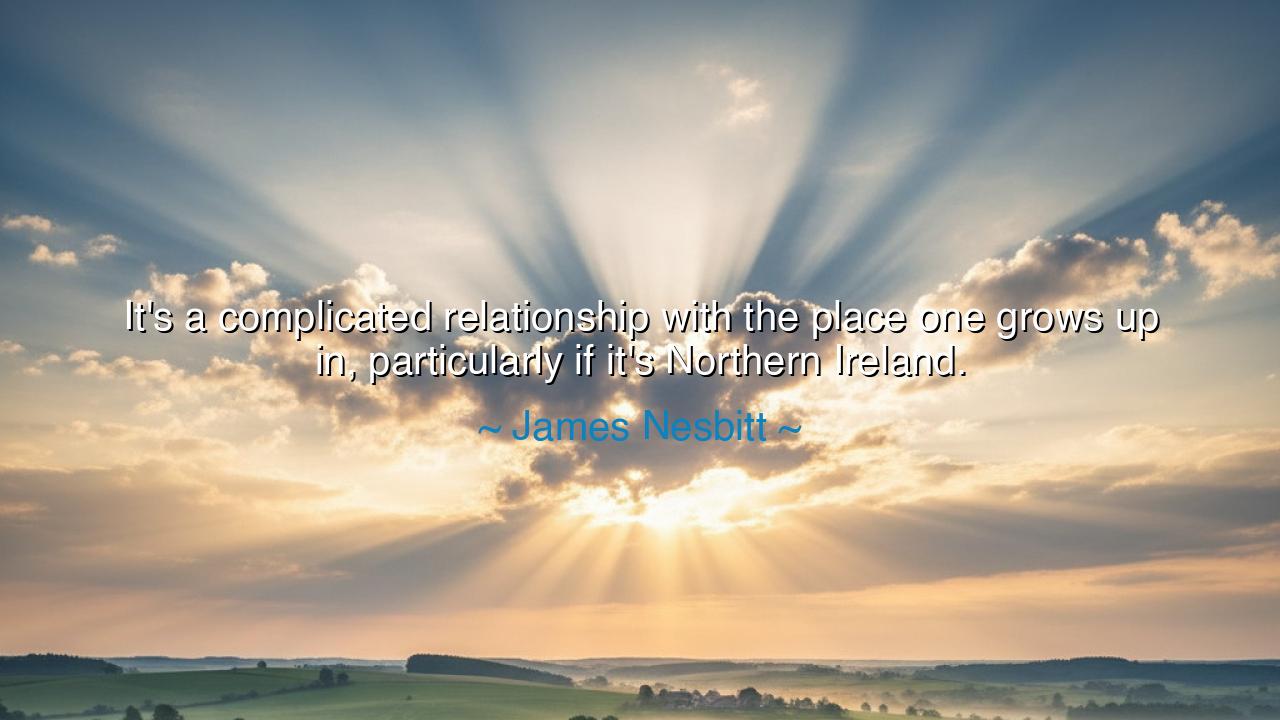
It's a complicated relationship with the place one grows up in
It's a complicated relationship with the place one grows up in, particularly if it's Northern Ireland.






The words of James Nesbitt, “It’s a complicated relationship with the place one grows up in, particularly if it’s Northern Ireland,” speak of the deep bond between soul and soil, between memory and land. For every man is shaped by the earth that raised him, by the hills and rivers that first met his eyes, and by the sorrows and joys written into the stones of his homeland. Yet when that land bears both beauty and strife, the heart’s tie to it is never simple.
To speak of Northern Ireland is to speak of a land steeped in history, a place where song and story mingle with wounds and divisions. Its green fields carry whispers of kinship, while its streets bear the weight of conflict remembered. Thus the relationship with such a land becomes a mingling of love and ache — an inheritance of belonging that can bless and burden alike.
The ancients knew that the place of one’s birth marks the soul as surely as a seal upon wax. From it comes accent, memory, and identity; yet it also gives the scars of strife, if strife is woven into its history. To leave such a homeland is to carry it still within, and to return is to face both tenderness and pain.
So Nesbitt’s words remind us that love of homeland is never a single note, but a chord — resonant with pride, sorrow, affection, and longing. To future generations, let this truth be told: that to know oneself is also to reckon with the land that shaped one’s spirit, whether it brought peace or turmoil. For the complicated relationship between person and place is part of the eternal story of mankind.






TT37-11C Vo Thanh Triet
The quote by James Nesbitt about growing up in Northern Ireland really made me reflect on how powerful a place can be in shaping one’s worldview. The legacy of the Troubles has undoubtedly left its mark on many, complicating their relationship with their roots. Do you think it’s possible to come to terms with such a complex and painful history, or does it inevitably linger, influencing how one sees themselves and their country?
KV37-Le Kieu Vi
James Nesbitt touches on a very real issue when discussing the complicated relationship with one's place of origin. Northern Ireland's history, full of division and conflict, likely makes the connection to home far from simple. How much of our identity is shaped by the history of the place we grew up in, and how much of that history can we move past? Does the deep-seated complexity of Northern Ireland’s past affect the way its people relate to each other today?
TCThuycoso camxuyen
I completely understand the sentiment behind James Nesbitt’s quote. Northern Ireland, with its fraught history, likely creates a complex emotional connection for anyone who grew up there. Can the generational impact of conflict and division ever fully be reconciled, or does it always remain a part of the identity of those from the region? How does this complicated relationship affect the way people from Northern Ireland view their own futures and the future of the region itself?
DLDNg Linhh
Nesbitt's reflection on Northern Ireland makes me think about how deeply a person’s roots can shape their sense of belonging, especially when those roots are tied to a place marked by conflict. It’s interesting how people from such backgrounds often find themselves torn between pride in their heritage and the pain of its history. Does this complicate the way they move forward in life, or does it give them a unique perspective on the world?
VHVan Ho
James Nesbitt's comment about the complicated relationship with one's upbringing, especially in Northern Ireland, speaks volumes. The region’s turbulent history, especially during the Troubles, likely shapes people’s emotional and psychological ties to the place they grow up. How do you think growing up in a place with such political and religious divisions affects personal identity and the way people view their hometowns? Can the complexities of a place like Northern Ireland ever truly be overcome by those who grew up there?